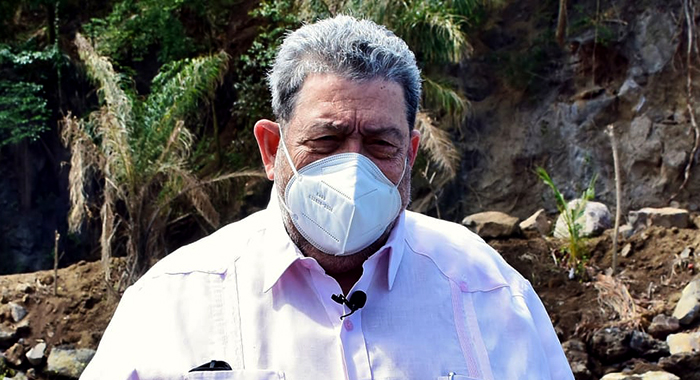Prime Minister Ralph Gonsalves was once known for his marathon press conferences, some of which, lasting more than three hours, came across more as national addresses rather than media briefings.
However, it has been some time since the prime minister has held a press conference, in-person or virtually — a format that became popular as a result of the COVID-19 pandemic.
Rather, Gonsalves has opted to take to radio — the state-owned NBC Radio, his party’s radio station — Star FM, and WE FM — on programmes whose hosts often come across as partners in the government’s public relations efforts rather than media inquiring on behalf of the public.
On March 11, the media got an opportunity to question Gonsalves on national and international issues, when he toured the site in Richmond, where his government has leased lands to a private sector entity for the operation of a stone quarry.
After Gonsalves had fielded questions about the quarry, iWitness News said: “Prime Minister, not about the quarry, specifically, but we don’t get to you like this often…”
iWitness News went on to question the prime minister about regional and international issues, including the Russo-Ukrainian war and its implications for St. Vincent and the Grenadines.
Other journalists also questioned the prime minister on regional and international matters.
Speaking the following Wednesday, March 18, on his weekly programme on NBC Radio, Gonsalves pointed out that he calls into programmes on three radio stations each week.
“I come on 705 once a week, I go on WE FM once a week and on Star once a week, at least. So you hear my voice three times on radio in the week.
“By the way, if any of the journalists complain say they don’t get a chance to ask me questions, they could ask me questions on any of these programmes,” the prime minister said.
“And certainly this one, they can send in their question by WhatsApp, and you read them out?” Gonsalves said to the host of the programme on NBC Radio.
“Of course, I do it all the time,” responded host Johnny P Straker, whose interaction with Gonsalves on the programme — outside of reading messages sent in by the public at the end of Gonsalves’ statement — is often confined to “Yes, Prime Minister.”
Gonsalves said:
“So I just want to make this point by keeping people informed.”
However, Gonsalves was proposing an arrangement where journalists would have to compete with the public to get to ask him a question.
Further, one journalist has told iWitness News that the host of a programme did not ask the prime minister a question the reporter submitted when Gonsalves was on air.
The host invited that journalist to attempt to interact with the prime minister live on air by calling the established numbers, but the reporter’s calls, placed repeatedly, were not among those that the host answered.
Many journalists in St. Vincent and the Grenadines might not have confidence in their colleagues at state-owned media asking questions on their behalf.
The tradition has been for state-employed reporters to act as information officers on behalf of the government rather than full-fledged journalists, as in the case in, for example, the United Kingdom and Taiwan.
Some years ago, Gonsalves gave Kelson McDowall, a journalist then employed at NBC Radio, a dressing down when he asked a question at a press conference.
Among other things, Gonsalves reminded McDowall of who his employer was.
When journalists are forced to telephone radio programme in order to question the prime minister, they are at the mercy of the host.
Further, the journalists have to compete with members of the general public trying to get the prime minister’s attention on a range of issues, some of which could be resolved by contacting the appropriate public servants.
However, journalists — or at least some journalists — have not only been having the time of it trying to get a question-and-answer session with the prime minister.
They have encountered similar difficulties trying to reach public officials, including those involved in the day-to-day management of the COVID-19 pandemic.
Last week, a senior journalist at another media outlet contacted iWitness News, saying, “I am wondering if you are having the same difficulties as we do getting [a named public health official] for an interview.”
iWitness News responded, saying that they were having the same issues and the editor said that the health official does not answer when the media outlet calls from their established numbers.
“… when we call using other numbers, [the official] will answer but says, ‘I am busy.’
“However you will hear soundbites from [that official] on [a radio station] and interviews with [a newspaper],” the journalist told iWitness News.






